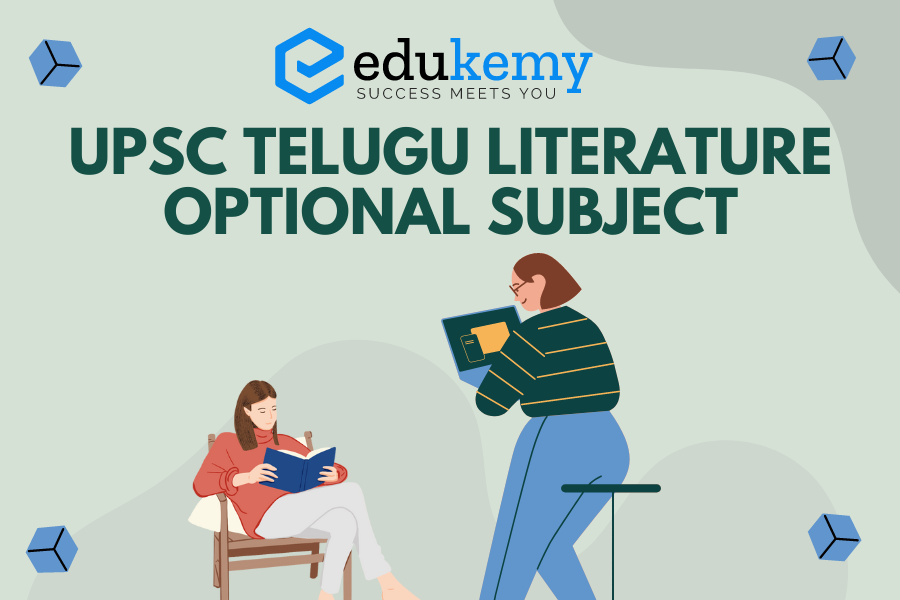
The UPSC Civil Services Examination offers Telugu Literature as a potential optional subject for the Mains exam. Delving into the rich tapestry of Telugu language and its literary heritage, this subject equips aspirants with a profound understanding of Telugu’s evolution, genres, and the socio-cultural context that shaped its literary landscape. By exploring the works of iconic authors from classical times to the modern era, candidates gain valuable insights into Telugu’s contribution to Indian literature and its enduring influence.
Contents
- 1 Telugu Paper 1
- 2 Telugu Paper 2
- 3 FAQs on Telugu Literature Optional Subject – UPSC
- 3.1 1. What is the syllabus for the Telugu Literature Optional Subject in UPSC Mains?
- 3.2 2. Why choose Telugu Literature as an Optional Subject?
- 3.3 3. What are the resources available for preparation?
- 3.4 4. How to approach the preparation for Telugu Literature Optional?
- 3.5 5. Are there any specific challenges in choosing Telugu Literature?
- 4 In case you still have your doubts, contact us on 9811333901.
Telugu Paper 1
Section – A
- Place of Telugu among Dravidian languages and its antiquity—Etymological History of Telugu,Tenugu and Andhra.
- Major linguistic changes in phonological, morphological, grammatical and syntactical levels, from ProtoDravidian to old Telugu and from old Telugu to Modern Telugu.
- Evolution of spoken Telugu when compared to classical Telugu-Formal and functional view of Telugu language.
- Influence of other languages and its impact on Telugu.
- Modernization of Telugu language :
(a) Linguistic and literary movements and their role in modernization of Telugu.
(b) Role of media in modernization of Telugu (News-papers, Radio, TV etc.)
(c) Problems of terminology and mechanisms in coining new terms in Telugu in various discourses including scientific and technical. - Dialects of Telugu—Regional and social variations and problems of Standardization.
- Syntax—Major divisions of Telugu sentences—simple, complex and compound sentences—Noun and verb predications—Processes of nominalization and relativization—Direct and indirect reporting-conversion processes.
- Translation—Problems of translation, cultural, social and idiomatic—Methods of translation—
Approaches to translation—Literary and other kinds of translation—Various uses of translation.
Section – B
- Literature in Pre-Nannaya Period—Marga and Desi poetry.
- Nannaya Period—Historical and literary background of Andhra Mahabharata.
- Saiva poets and their contribution—Dwipada, Sataka, Ragada, Udaharana.
- Tikkana and his place in Telugu literature.
- Errana and his literary works—Nachana Somana and his new approach to poetry.
- Srinatha and Potana—Their works and contribution.
- Bhakti poets in Telugu literature—Tallapaka Annamayya, ramadasu, tyagayya.
- Evolution of prabandhas—Kavya and prabandha.
- Southern school of Telugu literature-raghunatha Nayaka, chemakura vankatakavi and women poetsLiterary forms like yakshagana, prose and padakavita.
- Modern Telugu Literature and literary forms—Novel, Short Story, Drama, Playlet and poetic forms.
- Literary Movements : Reformation, Nationalism, Neo-classisicism, Romanticism and Progressive, Revolutionary movements.
- Digambarakavulu, feminist and dalit Literature.
- Main divisions of folk literature—Performing folk arts.

Telugu Paper 2
Section – A
- Nannaya-Dushyanta Chritra (Adiparva 4th Canto verses 5—109).
- Tikkana-Sri Krishna Rayabaramu (Udyoga parva-3rd Canto verses 1—144).
- Srinath-Guna Nidhi Katha (Kasikhandam, 4th Canto, verses 76—133).
- Pingali Surana-sugatri Salinulakatha (Kalapurno-dayamu 4 Canto verses, 60—142).
- Molla-Ramayanamu (Balakanda including avatarika).
- Kasula Purushothama Kavi—Andhra Nayaka Satakamu.
Section – B
- Gurajada Appa Rao—Animutyalu (Short stories).
- Viswanatha Satyanarayana—Andhra prasasti.
- Devulapalli Krishna Sastry—Krishnapaksham (excluding Uravsi and Pravasam).
- Sri Sri-Maha prastanam.
- Jashuva-Gabbilam (Part I).
- C. Narayana Reddy—Karpuravasanta rayalu.
- Kanuparti Varalakshmamma—Sarada lekhalu (Part I).
- Atreya—N.G.O.
- Racha Konda Viswanatha Sastry—Alpajaeevi.
FAQs on Telugu Literature Optional Subject – UPSC
1. What is the syllabus for the Telugu Literature Optional Subject in UPSC Mains?
The syllabus covers a wide range of topics related to the Telugu language and literature, including:
- History and evolution of Telugu language (from Proto-Dravidian to Modern Telugu)
- Literary movements and their impact on Telugu literature
- Major Telugu poets, writers, and their works
- Telugu grammar, linguistics, and literary criticism
- Modernization of Telugu language and the influence of other languages
2. Why choose Telugu Literature as an Optional Subject?
If you have a strong foundation in Telugu language and a passion for its literature, this subject can be a good choice. It allows you to showcase your in-depth knowledge and analytical skills specific to Telugu literature. Additionally, competition might be slightly less compared to some other popular Optional Subjects.
3. What are the resources available for preparation?
There are various resources available for your preparation, including:
- UPSC-recommended Telugu literature textbooks
- Telugu literary journals and magazines
- Online resources and study materials (be cautious about their credibility)
- Previous years’ UPSC question papers for practice
- Guidance from Telugu literature experts (if possible)
4. How to approach the preparation for Telugu Literature Optional?
- Develop a strong understanding of the syllabus and weightage of each section.
- Focus on building a strong foundation in Telugu language, grammar, and literary history.
- Read and analyze the works of major Telugu poets and writers.
- Practice writing critical essays and answer previous years’ UPSC questions.
- Consider joining online forums or coaching classes for guidance and interaction.
5. Are there any specific challenges in choosing Telugu Literature?
- Availability of study materials and coaching might be limited compared to some mainstream Optional Subjects.
- UPSC toppers in Telugu Literature might be less compared to other subjects, making it difficult to find their strategies.
In case you still have your doubts, contact us on 9811333901.
For UPSC Prelims Resources, Click here
For Daily Updates and Study Material:
Join our Telegram Channel – Edukemy for IAS
- 1. Learn through Videos – here
- 2. Be Exam Ready by Practicing Daily MCQs – here
- 3. Daily Newsletter – Get all your Current Affairs Covered – here
- 4. Mains Answer Writing Practice – here

